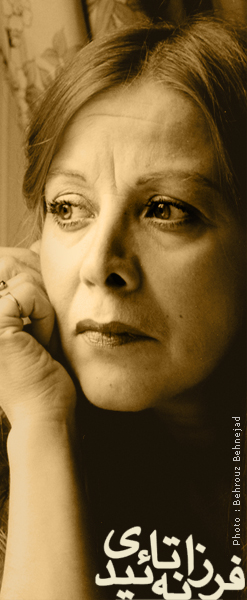 Farzaneh Taidi is an award-winning but controversial young
actress of the new Iranian cinema. After studying theater
and acting in Los Angeles, she debuted in the groundbreaking
Hashtoumine Rooze Haffteh, one of the first
Iranian films to center around a female protagonist. For her
role in this film she won a Seppasse for
"Best Actress" at the Teheran International Film
Festival. She was soon inundated with commercial offers by
producers wanting to exploit her blond hair and fair skin.
Farzaneh Taidi is an award-winning but controversial young
actress of the new Iranian cinema. After studying theater
and acting in Los Angeles, she debuted in the groundbreaking
Hashtoumine Rooze Haffteh, one of the first
Iranian films to center around a female protagonist. For her
role in this film she won a Seppasse for
"Best Actress" at the Teheran International Film
Festival. She was soon inundated with commercial offers by
producers wanting to exploit her blond hair and fair skin.
This offended the serious-minded actress who then launched
a public protest against those filmmakers who would continue
to portray women as only sex objects, and against the traditionally
low status of women in Iranian society.
She was soon boycotted by commercial producers, but this did
not keep her from winning a "Best Actress" award
in 1972 and another Seppasse for her roles in independent
films.
In 1975, Taidi appeared in the controversial Ghaire
Aze Khoudo Hitch Kasse Naboud where she played a
lesbian noblewoman forced to choose between her sexuality
or her social status. As the film contained graphic sex scenes,
it was banned in Iran. After that, no producer would hire
her.
From 1977-1979 she was unemployed; she spent the time actively
protesting the relegation of women and the compulsory veil.
She managed to find stage work in Teheran's Laleh Zare from
1979-1981 until she was placed on the banned persons list.
For several years after, she was humiliated by the revolutionary
guards until she escaped to London in 1986. She has lived
and worked there ever since.
Sandra Brennan
The New York Times |
|
|
|

